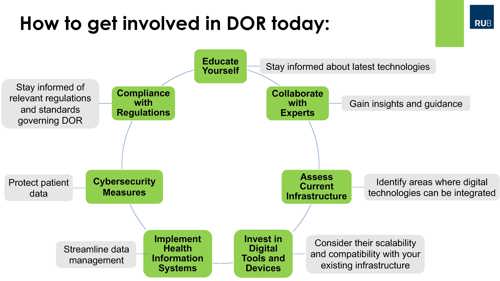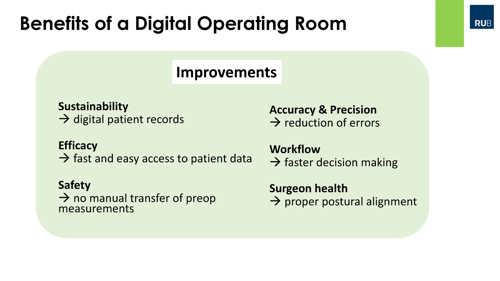Digital Operating Room
What Is Stopping Digital OR Adoption?
Ophthalmologists know the benefits—now it’s time to construct the right plan.

Timothy Norris
Published: Wednesday, May 1, 2024
“ Feedback from your patients and staff is also very useful for this task, helping you to improve and optimise. “
A digital OR (DOR) can potentially do a lot to create a more straightforward and effective clinical practice. “So, why is it still struggling to become widely used in Europe, let alone around the world?” H Burkhard Dick MD, PhD, asked during his presentation at the 2024 ESCRS Winter Meeting in Frankfurt.
“We cannot consider the possibility of a digitalised future if we don’t address and consider every possible barrier keeping surgeons from improving and upgrading their professional lives.”
What are these potential benefits? The first to consider, Dr Dick said, is sustainability. “Because you have everything digital, something that improves efficiency thanks to the fast and easy access to the patient’s data, with less paper involved,” he said. “All the data is converged into one single screen, also avoiding safety concerns due to the use of potentially harmful USB flash drives.”
Making those updates leads to a better understanding of the data, allowing faster decision making that can have an immediate positive impact on the workflow while also increasing accuracy and precision and reducing avoidable errors, he explained.
The digital OR also offers immediate ergonomic benefits, as reflected in the 2023 ESCRS Clinical Trends Survey: 52% of surgeons reported an improvement in efficacy and workflow with a DOR, with 42% underlining the improvement of comfort during surgery.
“Down the road, we also have to consider the surgeon’s health: I know a lot of colleagues who suffer neck or shoulder problems, and it is well documented how much we are subject to pain and all kinds of diseases,” Dr Dick said. “Visualisation is purely digital in the DOR, so you can just sit up straight—there’s no need to rotate during surgery.”
To build a functional DOR, Dr Dick outlined a simple but necessary roadmap to overcome the many barriers, including the first, costs.


“I would first determine which process must be streamlined, with a little help from the outside to improve and decide the next steps,” he said. “It is important to educate yourself, opting for a gradual approach, starting from budgeting basic digital tools such as a health record system, digital maps processing, and scheduling software to improve data management and patient coordination. You should also address your infrastructure and find an IT capable of protecting you from potential cyberattacks—especially during surgical procedures.”
He added a connectivity plan can be of the essence to avoid frustration.
“My recommendation is to be as cost effective as possible, gradually adjusting your set-up. Feedback from your patients and staff is also very useful for this task, helping you to improve and optimise. Even if the learning curve [remains] a psychological barrier, you should not fear the challenges that come with keeping up to date with the latest technologies.”
H Burkhard Dick MD, PhD is Professor of Ophthalmology and Chairman, Ruhr University Eye Hospital Bochum, Bochum, Germany. burkhard.dick@kk-bochum.de
Latest Articles
Addressing Postoperative Visual Complications
Managing aberrations after laser refractive surgery requires a multi-layered approach.
3D Printing Helps Transform Ukrainian Eye Care
The country’s ophthalmologists offer valuable experience in treating ocular trauma and prosthesis design.
Winning Essay Says ‘Collective Desire’ Must Drive DEI Implementation
Emerging Microbial Trends That Could Affect Your Practices
A triptych of challenges paints a concerning picture for ophthalmologists across the globe.
Improving Outcomes with Laser-Assisted Surgery
Femtosecond laser offers a multifunctional tool for improving the safety and efficacy of cataract and refractive lens exchange procedures.
Could the Corneal Transplant Pool Increase?
Modifying or discarding major contraindications for keratoplasty could mean more patients have their sight restored.
Matching Premium IOLs to Visual Lifestyles
From monofocal to full-range solutions, each practice needs comprehensive understanding.
Going Dutch on Acanthamoeba Keratitis
A world-first trial suggests a new medication could beat the disease.
ESCRS Today 2025: Happy Anniversaries!
ESCRS celebrates milestones with pioneers in IOLs, LASIK, femtosecond lasers, and corneal transplantation.
ESCRS Today 2025: A Congress for Everyone
From YOs to families, the ESCRS Annual Meeting embraces full participation through inclusivity.